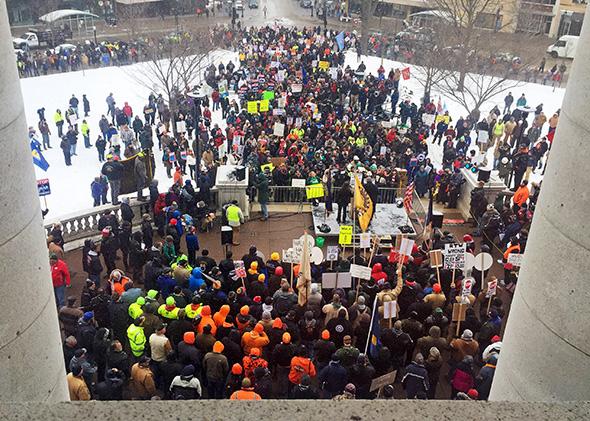MADISON, Wisconsin—When the Wisconsin State Assembly dropped the hammer on the state’s labor movement, the State Capitol was as quiet as a library. Maybe half a dozen ragged protesters stood outside the chamber hollering weakly, but the rest of the building and the grounds were serene. After two short post-vote press conferences, Madison sailed calmly on.
This wasn’t for lack of opposition. Legislators stayed up the whole night before the vote as Democrats tried to—well, it’s hard to say what exactly they were trying to do, since right-to-work’s passage was basically a done deal as soon as Senate Majority Leader Scott Fitzgerald announced in December that the statehouse would move on it. For all practical purposes, the Legislature’s all-nighter was a vigil for the Badger State’s organized labor movement.
Unions won’t vaporize overnight, of course: The right-to-work legislation that passed 62–35 on Friday morning just means private-sector employers can no longer make payment of union dues a condition for hiring. Democrats charge that this will hamstring unions, since employees will freeload without paying the dues that let them maintain their clout. Republicans say the legislation will create jobs and make the state more attractive for businesses.
Imagine I told you that North Dakota was going to ban fracking in six years. That’s how incredulous you’d be if you’d heard back in 2009 that Wisconsin was going to crack down on collective bargaining in the most right-wing way possible. But here we are: The legislation sailed through statehouse with zero suspense, and Gov. Scott Walker says he plans to sign it on Monday. Four years ago, Walker was just another Pawlenty-esque Midwesterner, and collective bargaining reforms were just a twinkle in his eye. Since then, he’s constrained public-sector unions, faced down more than 100,000 angry protesters, survived a recall election, won a re-election bid, defunded Planned Parenthood, and rocketed to the top of the 2016 Republican primary polls.
In the meantime, state Republicans have enjoyed full power over the state’s government and—as of a few hours ago—have easily made Wisconsin the 25th state to join the right-to-work column.
The Democrats watching this unfold Thursday night and Friday morning still seemed stunned.
“I’ve been asking over and over and over again, who asked for this bill? Who asked for this bill?” said Rep. Christine Sinicki, toward the end of the all-night talkathon. “I still have not gotten the answer.”
“We have spent the last four years trampling on the graves of those who have fought for these freedoms,” she continued. “I hope to God, I pray to God this is the overreach we’ve been looking for.”
Other Democrats came off as comparably frantic.
“Right-to-work will make it harder for families to live,” said Rep. Leon Young simply.
And Rep. JoCasta Zamarripa said the legislation “was serving merely as a distraction” from Walker’s budget.
In a press conference after the vote, Democratic Rep. Peter Barca also took a slightly apocalyptic tone.
“What we saw today is just one more example of right-wing fanaticism on steroids,” he said.
Regardless of whether you’d characterize the right-to-work law as fanatical or not, it’s remarkable the extent to which Madison kept mum about its passage. Besides a few dozen Democratic legislators and a few hundred labor protesters the day before, the famously liberal city was placid as the conservative legislation rolled along. The liberals who have faced Walker have lost, and lost, and lost again, and progressive Wisconsinites’ stores of outrage seem, at least for the moment, to be exhausted.
That’s not to suggest the left has given up. But Walker and the Republicans in the Legislature have more ideas they plan to advance, including cutting funding for the state’s universities.
“I think that this is purposeful on the part of Walker,” said Rep. Terese Berceau after the vote. “It’s not just about running for president. It’s just flooding us, flooding us so that it’s difficult for us to really focus in on one thing, because the next day it’s something else.”
“One day it’s workers’ rights,” she continued. “The next day it’s the university and cutting that, and the day after that it’s abortion restrictions, and the day after that it’ll be the environmental regulations that they are destroying.”
And if there’s one lesson from Thursday night’s calm, it’s that there’s little Democrats can do right now to come between Walker and his agenda. Walker talks often about his success in fighting for change. But Republicans’ overwhelming victories in the last few election cycles have let them dominate the state government, so they don’t really face much of a fight anymore. That’s why the state that birthed the organized labor movement in the United States is now right-to-work.
In Madison, it’s clear that Walker and his allies have learned how to take charge, get things done, and render their ideological foes irrelevant. First Wisconsin, then the country? The governor’s presidential prospects hinge on the possibility that that idea isn’t too far-fetched.
